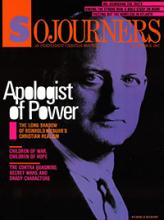CHILDREN OF WAR ARE DIFFERENT from other children. They seem older, sadder. Their young lives have been shaped by violence, terror, and death. Like all children, they have dreams and hopes for the future, but their goals may be as practical - though by no means easy - as simply being alive at the age of 17 or 20.
Such children can teach us a lot about war- and about peace. Their unique perspectives serve both as a warning to a world seemingly bent on self-destruction and as a sign of hope indicating how things could be different if we would work together for peace. The Children of War Tour was created in 1984 by the Religious Task Force, a coalition of U.S. church and peace groups, to take the children's double-edged message to the people of the United States. Last fall 54 young people traveled across the United States as part of the second Children of War Tour, hoping to help transform the wounds of war into action for peace.
Vicki Kemper and Sojourners Peace Ministry staff member Michael Verchot interviewed seven of the youths at the Sojourners office last November. We discovered that children of war are kids too. But between bites of popcorn and potato chips and talk of shopping and much-needed sleep, they touched our all-too-adult hearts and minds with their tragic yet hope-filled stories. We began by asking them to introduce themselves, to tell us a little about what it's like to be a child of war, and even to talk about what they want to do and be when they "grow up." --The Editors
Yair: My name is Yair Qedar. I come from Israel. I would like to be a filmmaker and make films that will contribute to.the understanding of all kinds of conflicts, social, economic, political, cultural, military.
Read the Full Article

